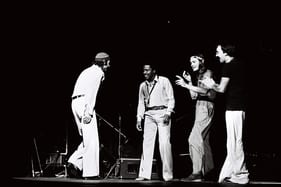 Since releasing the first edition of the iPad Enhanced version of my book “No Beethoven,” I’ve already managed to do several interviews with astute and interested journalists — thanks all for helping to spread the good word about my book!
Since releasing the first edition of the iPad Enhanced version of my book “No Beethoven,” I’ve already managed to do several interviews with astute and interested journalists — thanks all for helping to spread the good word about my book!A common question has come up time and again these past couple of weeks: what’s the lesson, if any, that the book offers?
I submit that it is most likely this: when in the course of human and artistic events, the collaborating musician must not personalize any criticism that is directed towards them. The heat of musical creation and performance brings out the beast as well as the best of us, and most all of us wear our musical hearts on our sleeves…so, if our egos bruise easily, we’re in for a world of pain AND we’ll probably miss out on the window-or-door-opening that honest criticism and feedback might offer. I got plenty of critical feedback as a drummer in Weather Report.
Now, I began my career as the youngest guy in the Kenton band, and that trend carried over to when I joined Maynard Ferguson’s band as well as Weather Report (and Steps Ahead, and John Abercrombie, and Bass Desires, and Kenny Wheeler’s band, etc). I had a lot of moxie … at least, enough moxie to survive the gauntlet of bebop machismo and insensitive criticism, reviews, etc that would come my way. (I was the “bus driver” of the band, and was professional enough to remember to be in charge when I needed to be…) I also knew and remembered that I had a lot to learn, and that “these guys knew a lot more about this stuff than I did” (especially in Weather Report!). And so, setting ego or feelings aside, I was then open to learning.
I’ll repeat this advice: do not personalize musical criticism! It has (or should have) nothing to do with who you are as a human being. As Stan Getz once explained (defending a rather uncomplimentary comment he’d made to me earlier): “Hey, I only talk that way to the people I like!”